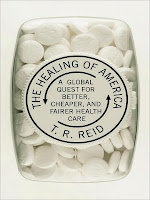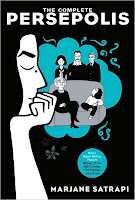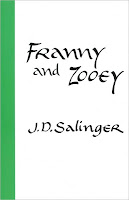 It has been a monumental week, no matter what side of the political fence you sit on. This week, the President of the United States signed healthcare reform into law. Now, I am not here to debate arguments, the situation or the yet-to-be-seen outcomes. I think we can all agree that our system is not a perfect one and it’s one that could benefit from some form of redesign. So that’s what I took a look at this week, turning to a non-partisan, highly informative and tremendously fascinating book: THE HEALING OF AMERICA: THE GLOBAL QUEST FOR BETTER, CHEAPER, AND FAIRER HEALTH CARE by T.R. Reid.
It has been a monumental week, no matter what side of the political fence you sit on. This week, the President of the United States signed healthcare reform into law. Now, I am not here to debate arguments, the situation or the yet-to-be-seen outcomes. I think we can all agree that our system is not a perfect one and it’s one that could benefit from some form of redesign. So that’s what I took a look at this week, turning to a non-partisan, highly informative and tremendously fascinating book: THE HEALING OF AMERICA: THE GLOBAL QUEST FOR BETTER, CHEAPER, AND FAIRER HEALTH CARE by T.R. Reid.
I found the individual country case studies fascinating. France has successfully converted to a completely digitized medical record all contained on a microchip that is affixed to a credit-card sized piece of plastic (a system, ironically enough, that was created by Americans). Preventive care is the focus of many of our European counterparts. Japanese citizens have access to over 2,000 health plans and can see a specialist immediately – often without an appointment.
Now, I am touting the pluses; but Reid goes into an objective analysis showing the successes and failures of each country’s system. He speaks to top health officials, health reformers and providers along the way creating a full picture of how other comparable nations are managing and providing health care. He breaks down a number of different models (of which the U.S. uses a little bit of every kind), myths (it’s not all socialized medicine outside of our contiguous 50 states) and realities (we are the only industrialized nation that doesn’t hold health care as a basic right for all its citizens).
Reid’s research found that American’s aren’t cold hearted. When polled, the vast majority are in favor of everyone having access to health care and think that most do. Unfortunately, there is a significant number of Americans who are uninsured, underinsured and unable to obtain health care. There is so much we can learn when looking at how others not just provide health care, but finance its delivery. There is tremendous opportunity to arm ourselves with information and knowledge to understand what we really have available and use that information to create a better, cheaper and fairer system.
I think Reid’s book is one tool to do just that.
Rating: 5 stars
Genre: Non-fiction
Pages: 288

 I read Kimmel’s first memoir, A Girl Named Zippy: Growing Up Small in Mooreland, Indiana during one of my annual girls’ trips to Mexico a couple years back. While taking in the sun, tasty margaritas and enjoying the simple things, I was enamored with this quirky small-town girl and her cleverly down-home way with words. She made childhood in a town of just 300 (THAT’S small!) a bit romantic. Living where everyone knows your name (forget that they all know your business, too) and where life seems less complicated or harried than that of the big city. I found her book utterly delightful, as did the friends with whom I shared it.
I read Kimmel’s first memoir, A Girl Named Zippy: Growing Up Small in Mooreland, Indiana during one of my annual girls’ trips to Mexico a couple years back. While taking in the sun, tasty margaritas and enjoying the simple things, I was enamored with this quirky small-town girl and her cleverly down-home way with words. She made childhood in a town of just 300 (THAT’S small!) a bit romantic. Living where everyone knows your name (forget that they all know your business, too) and where life seems less complicated or harried than that of the big city. I found her book utterly delightful, as did the friends with whom I shared it. I scooped up several copies of Abigail Thomas’ memoir, A THREE DOG LIFE, after hearing her read at a local, indepdendent bookseller a couple of years ago. The seal of approval on the cover by Steven King noting it as “The best memoir I have ever read.” was certainly intriguing, but I was more taken by her and the glimpse she gave us into her life.
I scooped up several copies of Abigail Thomas’ memoir, A THREE DOG LIFE, after hearing her read at a local, indepdendent bookseller a couple of years ago. The seal of approval on the cover by Steven King noting it as “The best memoir I have ever read.” was certainly intriguing, but I was more taken by her and the glimpse she gave us into her life. Week 9 was finished just time with Marjane Satrapi’s coming-of-age memoir, THE COMPLETE PERSEPOLIS, about growing up in Iran in the early 80s, at the height of social change, opression and war. What’s unique about her story, aside from the fact her story is in itself very unique, is the medium through which it’s told–graphically.
Week 9 was finished just time with Marjane Satrapi’s coming-of-age memoir, THE COMPLETE PERSEPOLIS, about growing up in Iran in the early 80s, at the height of social change, opression and war. What’s unique about her story, aside from the fact her story is in itself very unique, is the medium through which it’s told–graphically. I’ve had a secret: This week’s book was actually attempted last week and I made an executive decision to put it down and hold until another time, a less busy week, a week when I would have more time to devote to what I could tell was going to be a wild ride of a book.
I’ve had a secret: This week’s book was actually attempted last week and I made an executive decision to put it down and hold until another time, a less busy week, a week when I would have more time to devote to what I could tell was going to be a wild ride of a book.
 Dysfunction, junction… this collection’s a malfunction.
Dysfunction, junction… this collection’s a malfunction. Within just the first few pages of reading TEPPER ISN’T GOING OUT, I knew I was in for a pleasant ride (or perhaps I should say stay). Calvin Trillin’s slim story is a humorous tale of one Maury Tepper and his quest to find a perfectly good “legal spot” and park his Chevy Malibu to enjoy a read of the New York Post. His simple act to steal some quiet time puts the city in an absolute tailspin. Consipiracy theories abound as to why a middle-aged man would take to reading in his car versus an easy chair.
Within just the first few pages of reading TEPPER ISN’T GOING OUT, I knew I was in for a pleasant ride (or perhaps I should say stay). Calvin Trillin’s slim story is a humorous tale of one Maury Tepper and his quest to find a perfectly good “legal spot” and park his Chevy Malibu to enjoy a read of the New York Post. His simple act to steal some quiet time puts the city in an absolute tailspin. Consipiracy theories abound as to why a middle-aged man would take to reading in his car versus an easy chair. This week’s entry was picked for me as my February Book Club’s selection. Admittedly, it actually took me two weeks to read it, but finishing it up this week, I am counting it now. For those that know me well, I considered heavily (probably too much) if I should count this or not since I didn’t read this in an actual week and then I was quickly reminded that I had many more mundane things I could be fretting over and moved on.
This week’s entry was picked for me as my February Book Club’s selection. Admittedly, it actually took me two weeks to read it, but finishing it up this week, I am counting it now. For those that know me well, I considered heavily (probably too much) if I should count this or not since I didn’t read this in an actual week and then I was quickly reminded that I had many more mundane things I could be fretting over and moved on. I have often shied away from poetry. In all my love of literature, it has always seemed like the better educated sibling with whom I really couldn’t converse. While poetry would expound upon themes and metaphors, illusions and allusions, I would be wondering if anyone would jump in and be able to talk about the latest episode of the newest popular TV show, saving me from embarrassment and, ultimately, engaging me in something more my speed. In other words, smart as I think am, I didn’t always feel like I was in poetry’s league.
I have often shied away from poetry. In all my love of literature, it has always seemed like the better educated sibling with whom I really couldn’t converse. While poetry would expound upon themes and metaphors, illusions and allusions, I would be wondering if anyone would jump in and be able to talk about the latest episode of the newest popular TV show, saving me from embarrassment and, ultimately, engaging me in something more my speed. In other words, smart as I think am, I didn’t always feel like I was in poetry’s league.